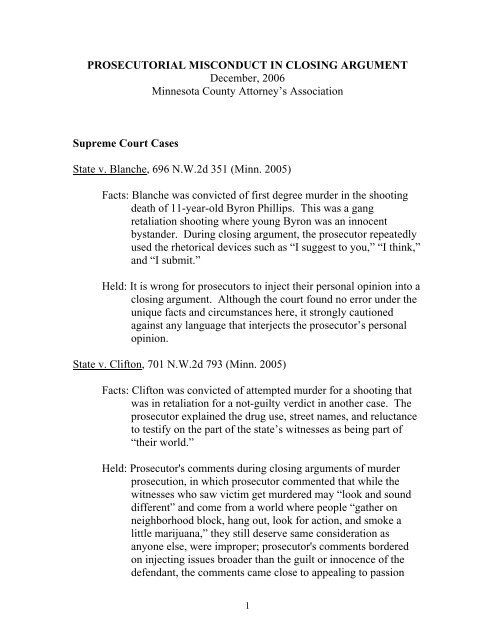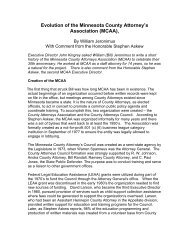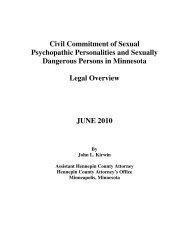PROSECUTORIAL MISCONDUCT IN CLOSING ARGUMENT ...
PROSECUTORIAL MISCONDUCT IN CLOSING ARGUMENT ...
PROSECUTORIAL MISCONDUCT IN CLOSING ARGUMENT ...
- No tags were found...
You also want an ePaper? Increase the reach of your titles
YUMPU automatically turns print PDFs into web optimized ePapers that Google loves.
<strong>PROSECUTORIAL</strong> <strong>MISCONDUCT</strong> <strong>IN</strong> CLOS<strong>IN</strong>G <strong>ARGUMENT</strong>December, 2006Minnesota County Attorney’s AssociationSupreme Court CasesState v. Blanche, 696 N.W.2d 351 (Minn. 2005)Facts: Blanche was convicted of first degree murder in the shootingdeath of 11-year-old Byron Phillips. This was a gangretaliation shooting where young Byron was an innocentbystander. During closing argument, the prosecutor repeatedlyused the rhetorical devices such as “I suggest to you,” “I think,”and “I submit.”Held: It is wrong for prosecutors to inject their personal opinion into aclosing argument. Although the court found no error under theunique facts and circumstances here, it strongly cautionedagainst any language that interjects the prosecutor’s personalopinion.State v. Clifton, 701 N.W.2d 793 (Minn. 2005)Facts: Clifton was convicted of attempted murder for a shooting thatwas in retaliation for a not-guilty verdict in another case. Theprosecutor explained the drug use, street names, and reluctanceto testify on the part of the state’s witnesses as being part of“their world.”Held: Prosecutor's comments during closing arguments of murderprosecution, in which prosecutor commented that while thewitnesses who saw victim get murdered may “look and sounddifferent” and come from a world where people “gather onneighborhood block, hang out, look for action, and smoke alittle marijuana,” they still deserve same consideration asanyone else, were improper; prosecutor's comments borderedon injecting issues broader than the guilt or innocence of thedefendant, the comments came close to appealing to passion1
and prejudice, and comments were demeaning. The Court reemphasizedits ability to reverse cases for prosecutorialmisconduct but declined to do so here because there was noexplicit reference to race, no use of race to disparage thedefendant and the defendant otherwise received a fair trial.State v. Jackson, 714 N.W.2d 681 (Minn. 2006)Facts: Defendant was convicted of aiding and abetting his fellowBloods gang members in first degree murder after being one ofthe people who shot at the victim after a fight at a party.During closing argument, the prosecutor argued that the whitevictim was targeted because he was white and that the juryneeded to understand the “gang world” and the need for respectwithin that world in order to understand why these gangmembers would shoot at someone who was running away.Held: The challenged statements did not constituted misconductbecause they properly introduced the state’s argument about therole of respect in the motive for the murder. This is an area that“may be unfamiliar to the average juror.” The Supreme Courtalso found it important that the prosecutor did not invite thejury to compare their world to this gang world.State v. Mayhorn, 720 N.W.2d 776 (Minn. 2006)Facts: Defendant was convicted of first degree premeditated murderfor a shooting in Moorhead, Minnesota. The Supreme Courtfound prosecutorial misconduct in a number of areas.Held: New trial. 1) The prosecutor’s question during cross that “youwouldn’t know the truth if it hit you in the face” injected theprosecutor’s personal opinion – analogized to the prohibition inclosing argument; 2) Although the trial court admitted evidenceof defendant’s involvement in a prior “shoot out” it wasmisconduct to cross-examine the defendant about the “shootout”and reference it 13 times during cross and again in closingargument; 3) it was misconduct to cross-examine the defendantabout his failure to call an alibi witness; 4) it was misconduct tomisstate the evidence and use “were they lying” questions in2
cross-examination of defendant; 5) it was misconduct for theprosecutor to say in closing “This is kind of foreign for all ofus, I believe, because we’re not really accustomed to this drugworld and drug dealing.” Although statements about the “drugworld” may be permissible, it is misconduct for the prosecutorto align themselves with the jury as part of a different group ofpeople; 6) it was misconduct for the prosecutor to comment, incross-examination and in closing, about the defendant’sopportunity to tailor his testimony by his mere presence at trialabsent some evidence of actual tailoring; 7) it was misconductfor the prosecutor to comment that “Lyra” was an appropriatename for a defense witness because it injected the prosecutor’spersonal opinion into the case.State v. Paul, 716 N.W.2d 329 (Minn. 2006)Facts: Defendant was convicted of first degree felony-murder after adrive-by shooting in Minneapolis. During closing argument,the prosecutor told jurors about the “real world” wherearguments are settled by a gun and where a victim’s friends andfamily won’t cooperate with the police.Held: Remarks did not rise to the level of misconduct because 1) theremarks were brief; 2) the jury was not asked to compare theirown “world” with the “real world,” 3) the remarks were basedupon the evidence, 4) the remarks were not demeaning in thatthe did not mention race, culture or neighborhoods, and 5) theremarks were intended to address the lack of cooperation by thestate’s witnesses rather than to appeal to the prejudices of thejury.State v. Ramey, 721 N.W.2d 294 (Minn. 2006)Facts: Defendant was convicted of violating a protective order.Defendant appealed claiming, among other things, that theprosecutor committed misconduct by improperly injectingpersonal opinion into closing argument, vouching for witnesses.None of this was objected to at trial.3
Held: There is a new plain error standard for reviewing unobjected-toprosecutorial misconduct.First, the defendant must show:1) Error;2) That was plain or obvious. Note: the court stated that“plain or obvious” means “conduct the prosecutor shouldknow is improper.”Then, the burden shifts to the state to demonstrate3) The misconduct did not prejudice the defendant’ssubstantial rights.State v. Ray, 659 N.W.2d 736 (Minn. 2003)Facts: Defendant and a friend hunted down and shot the victim afteran argument. In closing argument, the prosecutor, stated, ““I would suggest that if this happened in a lot of otherneighborhoods, say in Golden Valley, or Edina, or Minnetonka* * * the reaction of the citizenry * * * would be a whole lotdifferent from the reaction of the people in North Minneapolis.Later, the prosecutor argued, “I would suggest that if thishappened in a neighborhood in Edina, people * ** couldn't getto the phone fast enough to tell the police what they saw * * *to insure [sic] that this kind of conduct would never happen intheir neighborhood ever again. But this is a differentenvironment * * * and it's a challenge for you, because it's notin an environment that most, if not all of you people, arefamiliar with.”Held: Defendant was entitled to a new trial because, “the prosecutorinvited the jurors to view the entire occurrence as “involvingthree young black males in the hood in North Minneapolis,” aworld wholly outside their own. Such an invitation asks the juryto apply racial and socio-economic considerations that woulddeny a defendant a fair trial.4
Court of Appeals CaseIn Re Welfare of D.D.R., 713 N.W.2d 891 (Minn. Ct. App. 2006)Facts: Defendant was convicted of assaulting the victim with abaseball bat and then raping her. During closing argument, theprosecutor told the jury that the victim had “no reason to makethings up” and that the victim “could not be lying if she said thesame thing over and over.” In addition, the prosecutor argued“[I]n order for you to find him not guilty, you are going to haveto find that she made up this whole thing to accuse a stranger,that she lied here in Court, she lied to the hospital, she lied tothe police, she lied to her mom, she lied to her friend, themedical evidence about whether there are samples or not,Randine Petersen's testimony that her injury is consistent withanal penetration, all that is wrong….[Appellant is] no longerpresumed innocent····”Held: 1) The prosecutor improperly vouched for the credibility of thewitnesses by essentially guaranteeing that the victim cannothave testified untruthfully based on her age and consistency. 2)The prosecutor impermissibly shifted the burden of proof andmisstated the presumption of innocence.5






